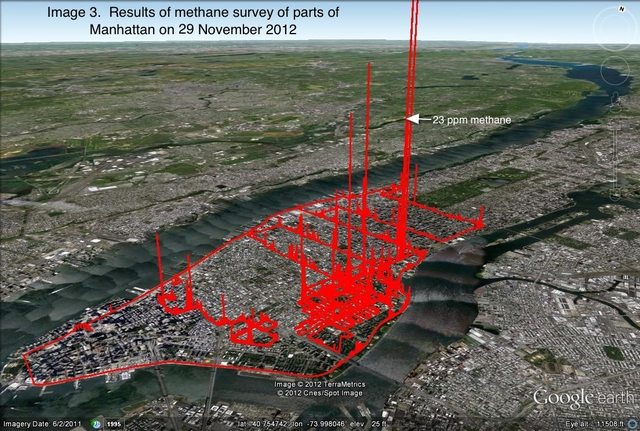Actual Methane Emissions Measured in Manhattan Show No Advantage to Natural Gas: Two Reports
April 01, 2013 (PRLEAP.COM) Business News
We now have empirical evidence that current steps of continuing and increasing natural gas use would only accelerate climate change. Two reports, co-authored by Dr. Bryce F. Payne Jr and Robert Ackley of Gas Safety, Inc. in Southborough, MA, resulted from a study commissioned by Damascus Citizens for Sustainability (DCS) of Damascus, PA in the Delaware River Basin, in order to better understand leakage from natural gas distribution systems in the context of global climate concerns.The level of leakage measured shows that natural gas should not be considered a "bridge fuel". In November and December of 2012, Gas Safety, Inc. recorded natural gas fugitive emission data during a 160-mile survey on Manhattan streets, and then did extensive analysis of the data collected and previous leakage estimating schemes.
There is an increasing awareness of methane as a potent greenhouse gas and in its role in climate change. Natural gas is 93% methane, and methane is more than 20 times more potent a GreenHouse Gas (GHG) than CO2. Because natural gas generates less carbon dioxide when burned, it has been considered a cleaner energy source than other fossil fuels. However, to look at the emission levels from burning alone is to hide natural gas' total greenhouse impact. Even if only some methane leaks into the atmosphere during extraction, transport and delivery to the consumer, then what had been assumed was a small gas carbon footprint is in reality a highly significant gas carbon footprint.
The Gas Safety, Inc. Preliminary Report reveals that Manhattan sits in a cloud of elevated levels of methane. The data was collected using a Picarro device equipped with Cavity Ring-Down Laser Spectrometer measuring equipment and found that the methane measurements in Manhattan indicated many leaks, some intense. The Extended Report reviews existing estimates and leakage estimating procedures used by industry, government and others (including the EPA/Gas Research Institute 1996 method) to arrive at estimates of methane emissions. Based on those reviews DCS is forced to conclude that those estimates understate the problem so much as to be almost useless – in fact, misleading.
The Extended Report takes an innovative approach using actual measurements and an elegantly simple method that arrives at the conclusion that there is no advantage to natural gas over coal or oil. The authors developed a rapid assessment method based on actual ground level methane measurements and meteorological data that was used to generate an estimate of total methane emissions in Manhattan. This emissions estimate made it possible to assess the relative impact of gas service in Manhattan, most importantly in the broader context of GHG and climate change. In addition, there are other issues: the extra cost to consumers of loss of product; the damage to trees and other organisms; the danger of explosion and toxicity to underground workers; and the public health threat of constantly escaping natural gas evidenced by elevated methane levels. (Remember, natural gas is a mixture of mostly methane, but also varying quantities of BETX, PAH, other VOCs, H2S, CO2 and radioactive radon and radon decay products.)
The actual measurements in this report added to measured production losses and estimated transmission losses produces a total gas loss above 5%. This number is well above the critical benchmark level of less than 3.2%, at which level natural gas no longer retains an advantage over other forms of fossil fuels with regard to climate change. Because methane is at least 20 times more powerful a GHG than CO2, the measured 2.8% leaked in Manhattan more than cancels out the 50% less CO2 from all the rest burned.
"The methane leakage in the system serving NYC through ConEd is likely already at a level where the methane leaked has as much, or more, climate impact as the remaining approximately 95% of the gas that is actually usefully burned by consumers in NYC." states, Dr. Bryce Payne.
REPORTS available: http://www.damascuscitizensforsustainability.org/2013/03/manhattan-natural-gas-pipeline-emissions-2/
Report on a Preliminary Investigation of Ground-Level ambient Methane Levels in Manhattan, New York City, New York Extended Report on Preliminary Investigation of Ground-Level Ambient Methane Levels in Manhattan, New York City, New York
Authors: Robert Ackley and Bryce F. Payne Jr., PhD.
Damascus Citizens for Sustainability (DCS)
Office:25 Main Street, Narrowsburg, NY 12764 Phone; 845-252-6677
Mail to:P.O. Box 147, Milanville, PA, 18443
website: DamascusCitizens.org
CONTACT: B. Arrindell, Director, Damascus Citizens for Sustainability
dcs@DamascusCitizens.org phone:845-252-6677
Dr. Bryce Payne, bryce.payne@gassafetyusa.com
